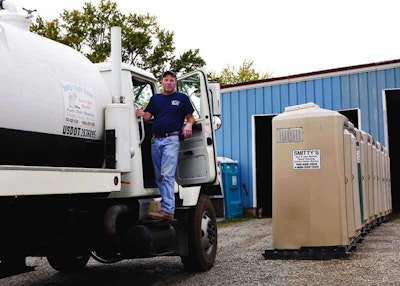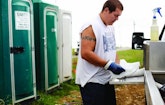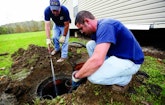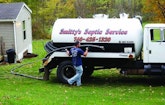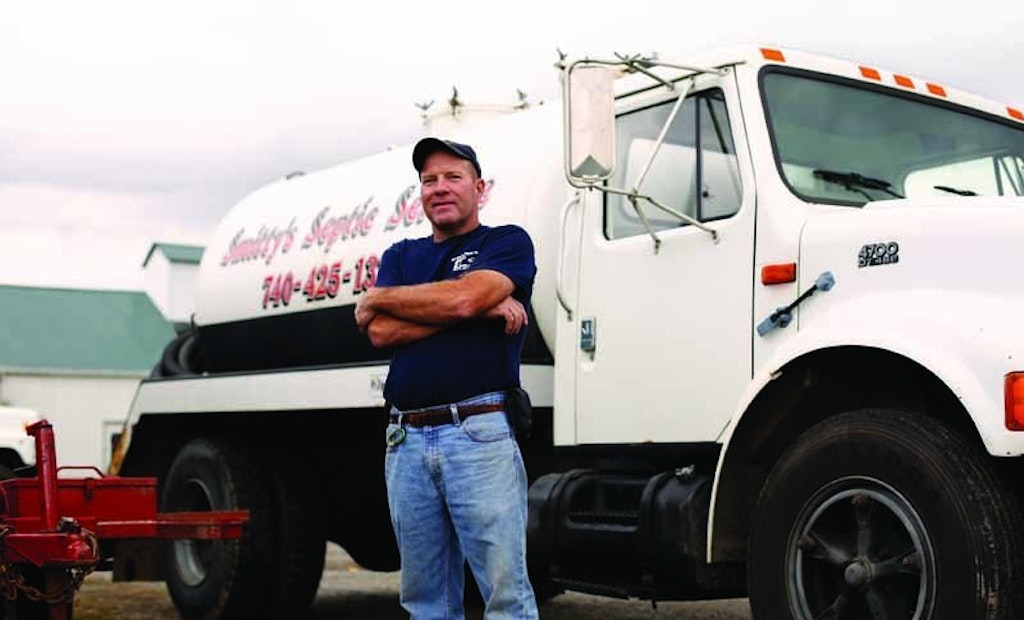Interested in Plumbing?
Get Plumbing articles, news and videos right in your inbox! Sign up now.
Plumbing + Get AlertsIn a rural area of eastern Ohio, where good jobs are hard to come by, pumper Terry Smith has experienced firsthand the vagaries of the economy. At one time the coal industry was thriving and wages were good, but that didn’t last, and it was decades before the area saw another such boom when oil and gas companies came in. But the price of oil has dropped and work related to that industry tailed off.
With these experiences, Smith has learned to take things slow and easy. He doesn’t make any sudden moves and runs his company in a conservative and financially safe manner. He tries to roll with the punches, but they never stop coming, whether it’s the economy, new regulations or difficulty finding a disposal facility. Perseverance is important for a small family business, he has learned.
Smith acknowledges that instead of protecting his company, his risk-averse nature may sometimes have the unintended consequence of actually holding it back in some ways. He recognizes a need to invest in technology, for instance. He wants to update the fleet and equipment. While he has steady business from his loyal residential customers, he knows he’s got to make a few changes to keep up or maybe even get ahead of the game.
Smitty’s Septic Service provides septic and grease pumping, drainline cleaning and camera inspection services, and portable restroom rentals in about a 30-mile radius of Barnesville, Ohio. Smith’s team includes full-time drivers Kevin Hoff and Michael Kubat and part-timer Jordan Cook. Phone answering and invoicing is done by part-timer Susie Sellers. Although his wife, Nancy, is not directly involved, Smith considers her a co-owner and a vital element. “She’s been very supportive and understanding and is a very important part of the business,” he says. Office work is done at their home, and trucks and equipment are stored in a nearby garage and lot.
EASING IN
Smith’s father-in-law, Don Cook, was a self-employed excavator and onsite installer who always had the desire to buy a vacuum truck to tie in with his other work. That vision was finally realized in the 1980s. Smith helped Cook with the septic work, but by then they both were working in the coal industry, which at the time offered very good jobs, and eventually the truck was sold to another pumper.
Within a few years the coal company layoffs started and Smith took a maintenance job at the local bank. A couple years later he tried to buy the vacuum truck back, hoping to pick up work on the weekends. In 1994, a deal was struck, and he not only got the truck back but the pumper’s entire business.
Smith continued his full-time job at the bank for two years and pumped tanks on the side. Then he added portable restrooms, which gave him enough extra income to go part time at the bank.
“I didn’t think septic alone would allow me to do the full-time thing,” he says. “And to me it was just something that went hand in hand with my other work.” In another two years he was able to quit his job. Employee No. 1 was his son, Nathan, who worked with him from the time he was 8 right through his college years. Back surgery and a career with a power company prevent Nathan from helping out these days, but Smith says he was a very important part of the business — “and still is; he’s a big encourager.”
BREAD AND BUTTER
Regardless of economic ups and downs, Smith has steady business from his residential septic customers. For one thing, he enjoys something of a monopoly in his town, as do other pumpers in the area. “The towns are all spaced out about 20 miles apart,” he says. “So we’ve got competitors, but they’re not backdoor competitors.”
Smith doesn’t provide reminder cards to his customers and admits a lot of his work ends up being emergencies. “I usually only plan half the day,” he says, “because it seems like the other half is going to be somebody calling saying, ‘Can you get here today?’”
The company uses a Spartan Tool camera, a RIDGID Scout locator and two vacuum trucks — both Internationals (1997 and 1999) built out by Imperial Industries, one with a 1,900-gallon waste/200-gallon freshwater steel tank and the other a 3,600-gallon steel tank, both with Moro USA pumps.
THE OTHER HALF
Portable restrooms generally provide about half Smith’s revenue, but the work is unpredictable and less steady. Although he wanted portable sanitation to be the ticket to full-time pumping, he didn’t want to risk a lot of money trying it out. He started with six T.S.F. Company units he picked up from pumper Ivan Miller about an hour away in Dundee, Ohio. “My wife and I were just visiting up there and by chance happened to see a lot of his units sitting around, and we stopped in to talk to him,” Smith says. A fruitful relationship was born that continues to this day.
He also saved on the startup by using his septic truck to pump restrooms. After he made some money, he bought a Chevrolet pickup with an Imperial Industries slide-in unit, and then eventually two Ford F‑550s (2002 and 2013) with 680-gallon waste/300-gallon freshwater steel tanks and Masport pumps built out by Imperial, as well as a used eight-unit hauling trailer and a 2008 Chevy pickup with a liftgate that can hold three units.
When oil and gas companies came to the area about three years ago everyone was excited. “You know how they talk about the gold rush? It was no different,” Smith says. He knew he could provide a service for them, but also realized if he wanted to get in on the action he had no choice but to make some investments. He says he increased his inventory of units “tremendously” and bought another vacuum truck, a 1998 International with a 1,100-gallon waste/400-gallon freshwater steel tank and Masport pump built out by Keith Huber.
A first sign of trouble was when competitors started coming in from Pennsylvania. Then oil prices dropped and the whole industry slowed down. “It slammed me hard,” he says. “We didn’t see that coming at all.” Of course, everyone hopes the slowdown is temporary.
Today, Smith has 300 restrooms in his inventory, many from T.S.F. Company, some from Satellite Industries. Most are tan, some are dark green. Besides oil and gas fields, he has units out at ball fields, parks and construction sites. He also does a few local events, the biggest being Jamboree in the Hills, a country music festival attended by over 100,000 people for which he supplies units to the outside campgrounds.
LONG-DISTANCE DISPOSAL
Smith took waste to the local treatment plant for 15 years. But when the Ohio Environmental Protection Agency came in and issued a number of requirements, the treatment plant stopped taking septage from haulers. Smith had no choice but to use a private facility, the nearest being 30 miles away. As a result, his expenses increased. “On the bigger tanks, the dump fee quadrupled,” he says. “Then you had 60 miles round trip, so you had more fuel, more of your time, everything. The only thing good about it was we were able to stay in business.”
The treatment plant isn’t really to blame, Smith says, but he doesn’t think the EPA is looking at the whole picture. “They want a safer environment; they’re encouraging homeowners to be more aware of this and get their tanks pumped more often,” he says. “And that’s perfectly fine. I’m all about that, too. But on the flip side, they don’t want to help provide us with any dumping facilities.”
WISH LIST
Smith tries to attend the Water & Wastewater Equipment, Treatment & Transport Show (WWETT) every year. “It’s nice to be able to talk to people in the same business, and hear the trials and tribulations they’re having to go through,” he says. He also enjoys seeing all the products. He has a few upgrades in mind for his business when he can manage it and wants to keep up with what’s out there.
For instance, on the equipment side he’d like to have a jetter for drain cleaning instead of using a snake. His camera is getting old and should be replaced. He’d like a newer fleet of service vehicles, including a four-wheel-drive vacuum truck, which would work out a lot better for oil and gas work.
He also knows he should have a website and computerize his records, but isn’t quite sure how to go about it. “I’m not much of a tech freak,” he says. “I don’t even have a smartphone.”
His son-in-law Adam Eccleston was going to come onboard in 2015 after his military career, but those plans have been delayed. “If he had been here I can assure you the technical side of things would have happened,” he says.
Despite the challenges, Smith says he’s grateful to be a part of the wastewater industry. He’ll continue to rely on good customer service, a supportive family and a hardworking crew, and look to grow in a steady, conservative way.
“You see so many things you’d like, but the bottom line is everything costs money and we are just a smaller company,” he says.
Crossing state lines
When the local treatment plant stopped taking waste from septic pumpers three years ago, Terry Smith, owner of Smitty’s Septic Service in Barnesville, Ohio, faced a big problem. And the solution wasn’t cheap. He’d have to use a private facility 30 miles away in Wheeling, West Virginia. The cost of having all his vehicles go there every day has been tremendous in terms of fuel, lost time and vehicle wear and tear.
He was hoping to mitigate the problem by buying a truck with a 3,600-gallon tank to combine loads and make fewer trips. But what he found out is, because it’s a two-axle vehicle and because he has to cross state lines to get to the facility, he’s now subject to U.S. Department of Transportation rules and regulations. “We had to get a DOT number and that’s just created a mess,” Smith says. “There’s all kinds of compliance for that. I just didn’t realize that was going to happen.”
Smith says he’s still trying to figure out all the requirements, but knows drivers have to be commercially licensed and interstate vehicles require apportioned license plates so they can be assessed a proportionate amount of road taxes. “And you have to fill out paperwork every day, you have to have the trucks inspected, they can stop you on the road,” he says.
Smith still isn’t sure his plan to combine loads in the bigger rig will be worth the effort. “I haven’t seen if that’s going to be beneficial in the long run because of all this compliance,” he says.
